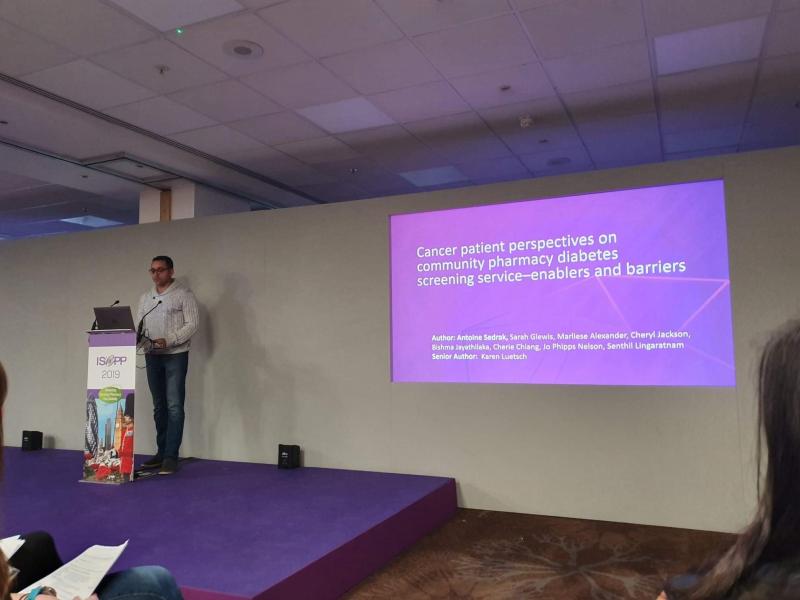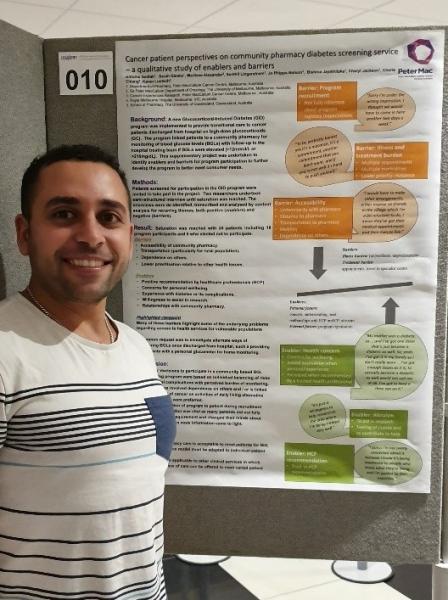By Antoine Sedrak, Peter MacCallum Cancer Center, Australia
In this article, I will share what I have learned from attending the International Symposium on Oncology Pharmacy Practice (ISOPP 2019) held from 10th to the 14th of October 2019 in London, United Kingdom.
I have been working as a clinical pharmacist for over 9 years in many different areas including general medicine, cardiology, infectious disease and intensive care. I have been working as an oncology pharmacist at Peter MacCallum cancer center in Australia for the last 3 years. During this time I had multiple roles including dispensary, clinics, day therapy and inpatient wards where I have provided clinical pharmacy services to surgical, medical oncology and haematology patients. I have also published in research journals and presented in the Australian hospital pharmacist conference (SHPA).
My first ISOPP experience in London was very exciting where I got to learn a lot about oncology pharmacy. Not only did I learn so much from this conference but was also able to interact with many international pharmacy members and provide me with the opportunity to present my research work as an oral presentation entitled “Cancer patient perspectives on community pharmacy diabetes screening service – A qualitative study of enablers and barriers” where I discussed a newly implemented program at Peter MacCallum Cancer centre. The program involves referring patients newly commenced on high dose corticosteroids to a community pharmacy in their vicinity where they can have their blood glucose levels monitored whilst on the steroids. The community pharmacy would then refer their patients to either the general practitioner or the endocrinology team at the hospital if the blood result is high. My research involved looking at patients’ perspective about joining such service.
The ISOPP symposium was very well organised with regular emails entailing what would be presented and an app, which was available on apple and android platforms, which was very helpful in informing me about seminars information and times.
The posters presented were of excellent quality and provided learning opportunities of research from other countries and, during intermission, I had time to walk around and read posters and ask exhibitors questions. It also gave me an opportunity to meet multiple professionals in the pharmacy practice, from drug reps to pharmacist consultants across the world where I got to discuss different practices and procedures from across the world.
Some memorable moments included talking to a pharmacist from Kenya about their health service. They informed me how expensive cancer treatments such as immunotherapy and targeted therapy were rarely available to their cancer patients due to their high cost. Only patients who were very rich were able to afford such therapy and therefore he had limited knowledge about it as he wouldn’t dispense it often. Even cheaper chemotherapy was still an issue as it could cost half a patient’s monthly wage. This was surprising and very saddening that so many patients do not have access to such life-saving medication. It has also made me really appreciate Australia’s healthcare system and how we take it for granted sometimes.
I also met Pharmacists who work in Lebanon as directors of pharmacy. They informed me that the access to medications for patients was not an issue but required different types of reimbursement providers such as different health insurances, health coverage by work, and/or government funding. A patient may go though many different channels to fund their treatment where each channel may only fund a certain treatment or a certain part of a treatment. This highlighted the importance of the pharmacist in Lebanon in not only adding clinical value to the patient’s treatment but also assisting in obtaining funding for treatments.
I was also very surprised about the UK pharmacist practice where there are pharmacist consultants who meet patients in clinics and decide what treatment they require followed by prescribing those cancer treatments to these patients. Although in Australia pharmacists do see patients in clinics where they discuss their treatments and provide recommendations to their treating doctors, pharmacists are not allowed to prescribe in Australia. This was exciting to hear how advanced the pharmacy profession has become in other countries and hopefully Australia gets to join those countries one day.
I particularly enjoyed the introduction to oncology workshop where Emma Foreman, a consultant pharmacist from the Royal Marsden NHS foundation trust, discussed targeted therapies in detail. Another memorable talk included the one presented by Alex Britton, a radiographer from the university Hospitals of Leicester NHS trust, who talked about treatment with radiotherapy and their side effects. This workshop has provided very valuable information to enhance my oncology knowledge.
Other very notable sessions included cancer associated thrombosis by Simon Noble, Marie Curie professor at Cardiff University in Cardiff, where it was highlighted that cancer associated thrombosis was as dangerous as sepsis. This was very interesting as in my experience, most healthcare professionals become really concerned with when their patients develop cancer associated thrombosis but not to the same significance as sepsis. Sepsis is taken much more seriously even though they are both just as dangerous. Also, the management of CLL by Catherine Parbutt, consultant pharmacist for cancer services, the Leeds Teaching Hospital, NHS Trust, where she described the advancement of CLL treatment though the years. It was pleasing to see how far we have come and aspiring to see how much more we can achieve in the future.
Overall, participation in ISOPP 2019 has given me fantastic opportunities to share knowledge and experience with experts in the pharmacy field. It has also provided me knowledge that I can share with my co-workers back home and discuss different practice skills learned in the conference. Moreover, I would like to say a special thanks to not only ISOPP but BOPA for providing a wonderful opportunity to learn and attend this conference in London. All this was made possible with the support from ISOPP’s travel grant. I would thus, like to extend my heartfelt appreciation and gratitude to ISOPP for the travel grant and this opportunity.
 |
 |
| Antoine Sedrak is presenting at ISOPP 2019 | Antoine Sedrak at ISOPP 2019 Poster Exhibition |
